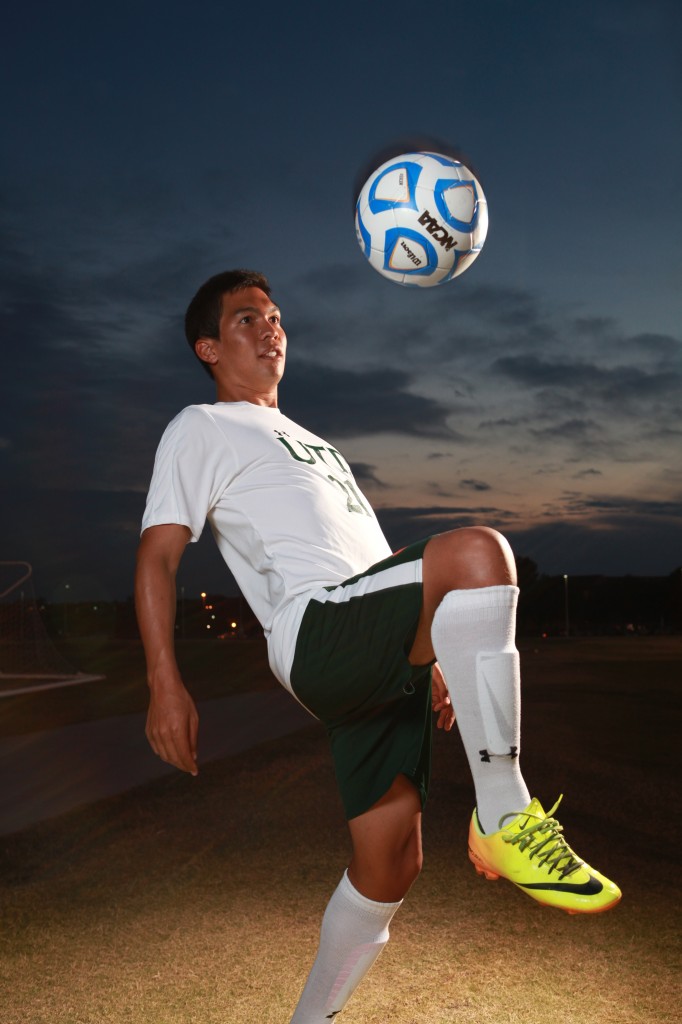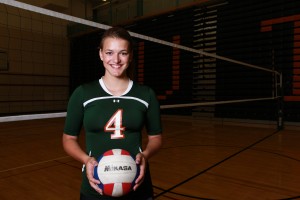Canadian v-ball player and Ecuadorian midfielder come to the United States for academics, chance to play
This is more of a reality for some players on campus more so than others.
For freshman Mallory Kirzinger and senior Eduardo Leal, their journeys to Richardson started in the lands of Canada and Ecuador, respectively.
Kirzinger, who hails from Calgary, Alberta, noticed UTD when she and her father were looking for schools in the U.S. where she could play volleyball.
“Me and my dad searched through a ton of schools, and we looked at how good they were academically, and we looked at the volleyball program and UT Dallas came up,” Kirzinger said. “I was like, ‘Hey, they’ve got good academics, they’ve got a good volleyball program, and they’ve got scholarship money as well.’”
She first came to campus when she went to a camp put on by the team her junior year of high school. She visited the campus three times before deciding to attend.
After seeing her display of commitment, head coach Marci Sanders knew Kirzinger would fit in well as a member of the team.
“We knew once she was willing and did come for camp that she was pretty serious,” Sanders said.

Unfortunately, Kirzinger’s application process was made more difficult due to her nationality. She said she had to prepare herself for some of the differences between the U.S. and Canadian education system, like the ACT, which she never had to study for.
Leal, on the other hand, had to face a totally different set of challenges when it came to his journey to the United States.
Born and raised in Guayaquil, Ecuador, Leal, who has played soccer since the age of 4, originally wanted to attend a private university in his home country. He aspired to study mechanical engineering and play soccer.
Unfortunately, he said political maneuvering mandated all private schools there to go public, at which point Leal decided to search for a school in the United States.
He first attended Mountain State University, a private school in West Virginia, where he experienced many changes.
“(Guayaquil) is always like 30 degrees Celsius average,” Leal said. “I went there, and I had three months straight of snow.”
However different West Virginia was, Leal still wanted to experience a larger city. It was from there he began to look at the possibility of attending UTD.
He heard about the school from a friend of his from Ecuador who played at UT Tyler.
“He got in touch with me and said he was interested,” said head coach Jason Hirsch. “We got the release form from that university and we started talking to him. He contacted me. He found UT Dallas. That’s how I got to know him.”
Going from a private school to a larger, public school in a new state presented yet another challenge to Leal. He said there were more international students at his first school and coming to a new school with more U.S. citizens made it somewhat difficult to adapt.
“In a private school it was easier, because you get to hang out with international people,” he said. “Here the majority of people that I know are from Texas. It was very different; it was very challenging for me. Luckily, Texas people were very nice, they were very polite to me. They helped me to adjust here.”
Leal also has to deal with the added barrier of dealing with a foreign language, which has made it difficult to express himself at times. He also has to try to stay in contact with his family still in Ecuador, which he says he does every day through Facetime and phone calls.
Kirzinger has to cope with similar problems in a new country.
“It’s been different,” Kirzinger said. “It’s weird not having my family, because I’m close to them. It’s been weird having people laugh at my accent, but overall it’s been a smoother transition than I thought it would be.”
She said being able to have volleyball as a distraction has helped her get over being homesick. Even on the court, though, she still has new challenges to deal with.
Canadian volleyball has different regulations, forcing Kirzinger to adjust to a different style of play. She said certain rules like the Libero being unable to serve and the ball being unable to touch the roof are new to her. This means Kirzinger has to step up her game dramatically to be able to compete with some of the other girls.
“In Canada, there’s a lot of rules that are different,” Kirzinger said. “There was some communication that I had to learn. I’m getting used to it…It’s the same game, it’s just spoken a little differently, I guess.”
In Leal’s case, the play of American soccer differed from the Ecuadorian method he was accustomed to.
“He definitely has a different style,” Hirsch said. “He’ll use the outside of his foot to curl the ball around someone…You can tell when you watch him he does things a bit different.”
Along with dealing with a difference in style, Leal had to deal with a difference in soccer culture. He said he was used to seeing soccer on TV all the time back in Ecuador, but when he came here he had to adjust to not being able to watch the game constantly.
More importantly, though, Leal saw the difference in seriousness people emphasize on the game here as they do in South America. Leal, who played for the Ecuadorian club Emelec, said players back home either study or play soccer, but not both. He said for around 90 percent of the players there, soccer is their only option in life.
“Either they play soccer to get out of poverty or they don’t succeed and do something else,” Leal said.
For first-year players like Kirzinger, the opportunity to play and prove themselves is crucial to their future on the squad. For the time being, her role is to learn and see how the team operates so she can become more of a contributor in a few years.
“(Sanders) likes to stick freshmen in situations and see how they do,” Kirzinger said. “None of the freshmen are guaranteed a lot of time. None of them are guaranteed a starting position.”
Even though both Kirzinger and Leal are mainly focused on their respective games, they do more than simply play.
Leal, who is majoring in mechanical engineering, is currently building a water treatment system using reverse osmosis to ship to other countries.
Kirzinger, on the other hand, plays several instruments, including the guitar, ukulele and alto saxophone.
With an international student population of nearly 5,000 students, it’s no surprise to see some of these foreigners compete as members of the schools athletic population. Still, most of the student athletes on campus are American, making international athletes something of an outlier.
That trend may be changing, at least on the soccer side of things.
“What you’ll find at the Div. I level, Div. II level, and especially the NAIA level, and now even into the Div. III universities, it’s becoming international,” Hirsch said. “There’s a lot of international student athletes starting to come into athletics in the United States.”

Leave a Reply